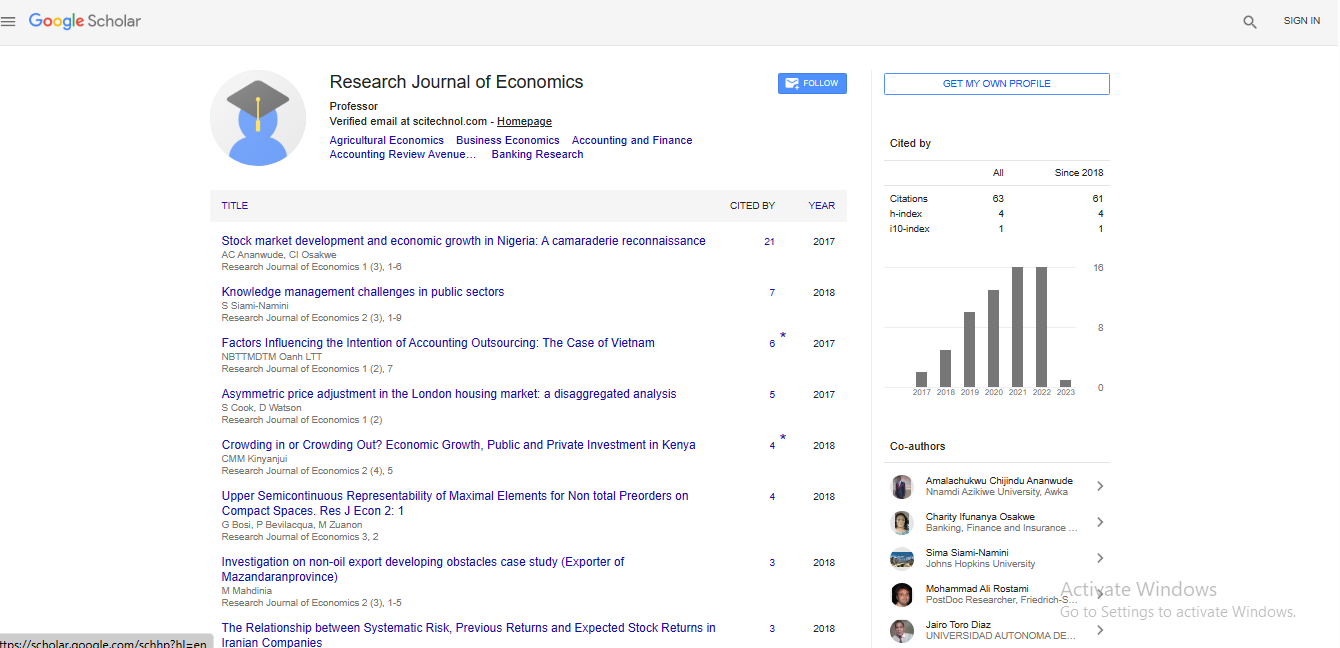Commentary, Res J Econ Vol: 7 Issue: 3
The Role of Macroeconomics in Different aspects of National Economies
Gang Jin Chi*
Department of Economics and Investment Management, Hunan University, Changsha, China
*Corresponding Author: Gang Jin Chi
Department of Economics and Investment Management
Hunan University, Changsha, China
E-mail: chijin@gang.cn
Received date: 28 April, 2023, Manuscript No. RJE-23-102366;
Editor assigned date: 02 May, 2023, PreQC No. RJE-23-102366 (PQ);
Reviewed date: 16 May, 2023, QC No. RJE-23-102366;
Revised date: 23 May, 2023, Manuscript No. RJE-23-102366 (R);
Published date: 30 May, 2023 DOI: 10.4172/RJE.1000152
Citation: Chi GJ (2023) The Role of Macroeconomics in Different aspects of National Economies. Res J Econ 7:3.
Description
Macroeconomics is a branch of economics that focuses on the study of the behavior and performance of national economies as a whole. It delves into the complexities of aggregate economic variables such as Gross Domestic Product (GDP), inflation, unemployment, fiscal and monetary policies. By examining these factors, macroeconomics seeks to understand and analyze the overall health, growth, and stability of an economy. This study explores the fundamental concepts of macroeconomics and their significance in shaping national economies.
Gross Domestic Product (GDP)
Gross Domestic Product (GDP) is one of the key indicators used to measure the overall economic performance of a country. It represents the total value of all goods and services produced within a specific time frame, usually a year. GDP provides insights into the size of the economy and its growth rate. It is composed of four main components: consumption, investment, government spending, and net exports. Changes in GDP can signify economic expansions or contractions, influencing various aspects of a nation's economy.
Inflation and unemployment
Inflation and unemployment are interrelated macroeconomic concepts that play a crucial role in shaping an economy. Inflation refers to the sustained increase in the general price level of goods and services over time. While moderate inflation is often considered healthy for an economy, high inflation can erode purchasing power and create economic instability. Central banks, such as the Federal Reserve in the United States, employ monetary policies to manage inflation through mechanisms like interest rate adjustments.
Unemployment, on the other hand, refers to the percentage of the labor force that is without a job but actively seeking employment. High unemployment rates can result in reduced consumer spending, lower aggregate demand, and slower economic growth. Policymakers use various measures to combat unemployment, including fiscal policies, job creation programs, and skill development initiatives.
Fiscal and monetary policies
Governments utilize fiscal and monetary policies to influence the overall performance of their economies. Fiscal policy involves the use of government spending and taxation to influence aggregate demand and stabilize the economy. During times of economic slowdown, governments may increase spending or reduce taxes to stimulate economic activity. Conversely, during periods of inflation or economic overheating, fiscal policies may aim to reduce spending and increase taxes to curb inflationary pressures.
Monetary policy, controlled by central banks, focuses on managing the money supply and interest rates to influence borrowing costs, spending, and investment. Central banks employ tools such as open market operations, reserve requirements, and discount rates to control inflation and stimulate economic growth. The effectiveness of monetary policy in achieving its goals depends on the prevailing economic conditions and the behavior of businesses and consumers.
International trade and exchange rates
Macroeconomics also encompasses the study of international trade and exchange rates. International trade plays a crucial role in determining a country's economic growth and competitiveness. The balance of trade, which compares a country's exports to its imports, impacts GDP and employment levels. Countries engage in trade to capitalize on their comparative advantages and benefit from specialization.
Exchange rates, the prices at which currencies are traded, are vital in international trade. They influence the competitiveness of a country's exports and imports. Exchange rate fluctuations can have significant implications for the trade balance, inflation, and the overall health of an economy. Governments and central banks monitor and sometimes intervene in foreign exchange markets to maintain stability and ensure the competitiveness of their domestic industries.
Conclusion
Macroeconomics provides a comprehensive framework for understanding the dynamics of national economies. By analyzing aggregate economic variables such as GDP, inflation, unemployment, fiscal and monetary policies, and international trade, policymakers and economists gain insights into the functioning and performance of economies. The interplay of these factors helps shape economic growth, stability, and the standard of living for individuals within a nation. Understanding macroeconomic principles is crucial for formulating effective policies and making informed decisions that can steer economies towards prosperity and resilience.
 Spanish
Spanish  Chinese
Chinese  Russian
Russian  German
German  French
French  Japanese
Japanese  Portuguese
Portuguese  Hindi
Hindi 